Key takeaways:
- Eco-friendly finance empowers individuals to support sustainable initiatives through spending and saving decisions.
- Ethical savings foster community development and promote organizations committed to social and environmental responsibility.
- Creating a sustainable budget aligns financial choices with personal values, enhancing both mindfulness and community support.
- Long-term ethical habits require continuous reflection, goal-setting, and community engagement to maintain motivation and commitment.

Understanding Eco-Friendly Finance
Eco-friendly finance is more than just a trend; it reflects a deeper commitment to sustainability and ethical practices in our financial decisions. For instance, I remember the moment I switched to a bank that prioritizes green initiatives. It felt empowering to know that my money was supporting projects aimed at environmental conservation.
When I first explored eco-friendly finance, I found myself grappling with the question: how can my spending choices contribute to a healthier planet? I realized that every dollar spent is a vote for the kind of future I want to see. Embracing this perspective not only transformed my spending habits but also ignited a passion for supporting businesses that align with my values.
Understanding eco-friendly finance goes beyond individual purchases; it’s about creating a community of like-minded individuals dedicated to making a difference. I often find that discussions with friends about sustainable investing lead to enlightening exchanges. Have you thought about how your financial decisions impact the world around you? This reflection can be a catalyst for positive change in both your life and the environment.
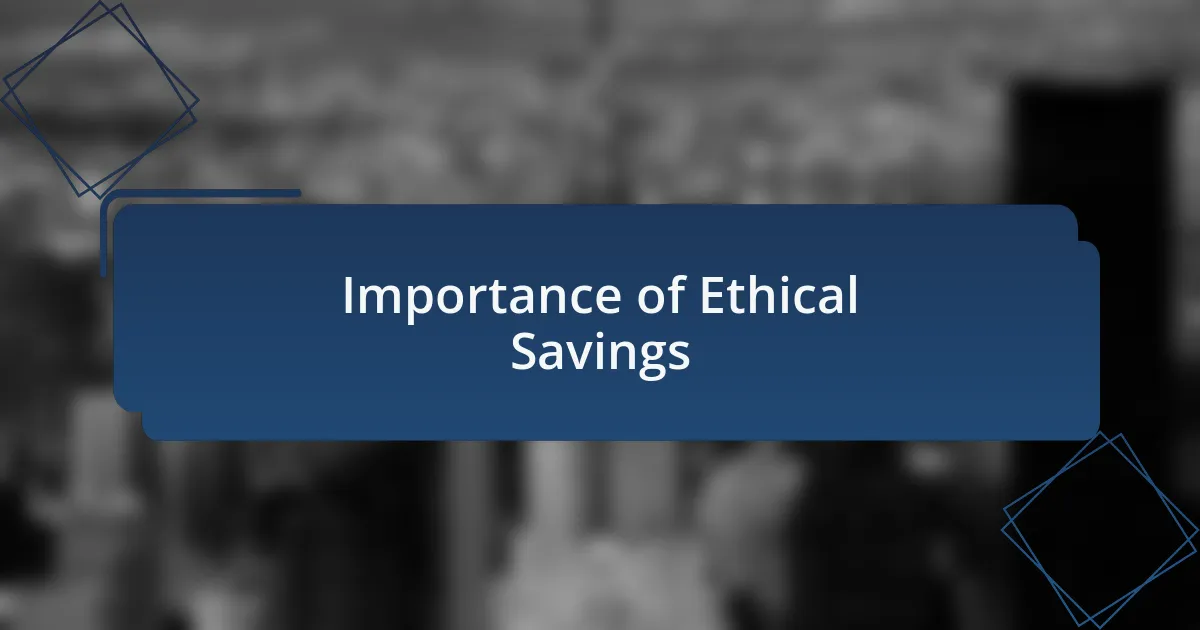
Importance of Ethical Savings
Ethical savings play a crucial role in promoting sustainability and fostering positive social impact. I still remember the day I opened an account with a credit union dedicated to community development. It felt rewarding to know my savings were helping local businesses and providing loans to those often overlooked by traditional banks. This connection to my community made my savings feel more significant.
When I think about the power of ethical savings, I often ask myself: how can a single deposit create a ripple effect? For me, it’s about understanding that each dollar I save is an opportunity to support projects that prioritize environmental health and social equity. Knowing that my choices contribute to renewable energy initiatives or accessible housing makes every moment I spend saving worthwhile.
Moreover, the importance of ethical savings extends beyond personal gain; it cultivates a sense of accountability. I find inspiration in the idea that my savings can shine a light on organizations that operate responsibly. Could my small, consistent efforts truly inspire others to rethink their financial habits? I believe they can, sparking a collective shift toward a more ethical and sustainable financial future.
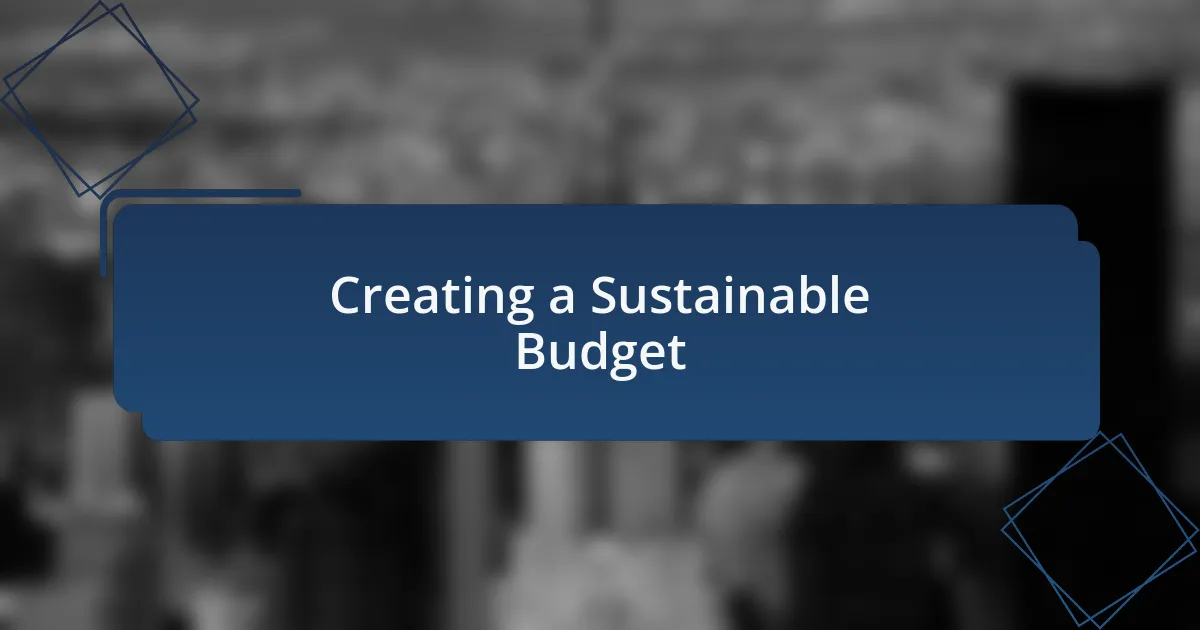
Creating a Sustainable Budget
Creating a sustainable budget goes beyond just tracking expenses; it’s about aligning your financial choices with your values. I remember when I first started crafting my budget to reflect my commitment to eco-friendly living. I began by prioritizing purchases that supported local, sustainable businesses, which not only made me feel good about spending but also nurtured my community.
I often ask myself: how can budgeting lead to greater personal fulfillment? For me, it’s about the joy of seeing my money work for the planet and people I care about. This perspective shift transformed my budgeting process into a more mindful practice, where every dollar spent felt like a conscious choice rather than a mere transaction.
Another essential aspect I discovered is the power of planning for unexpected expenses while staying true to my ethical goals. I created a specific fund for green investments and eco-friendly initiatives. It was uplifting to know that I was not only preparing for life’s uncertainties but also contributing to sustainability in the process. How could anyone not feel inspired by knowing their budget plays a role in nurturing a healthier planet?
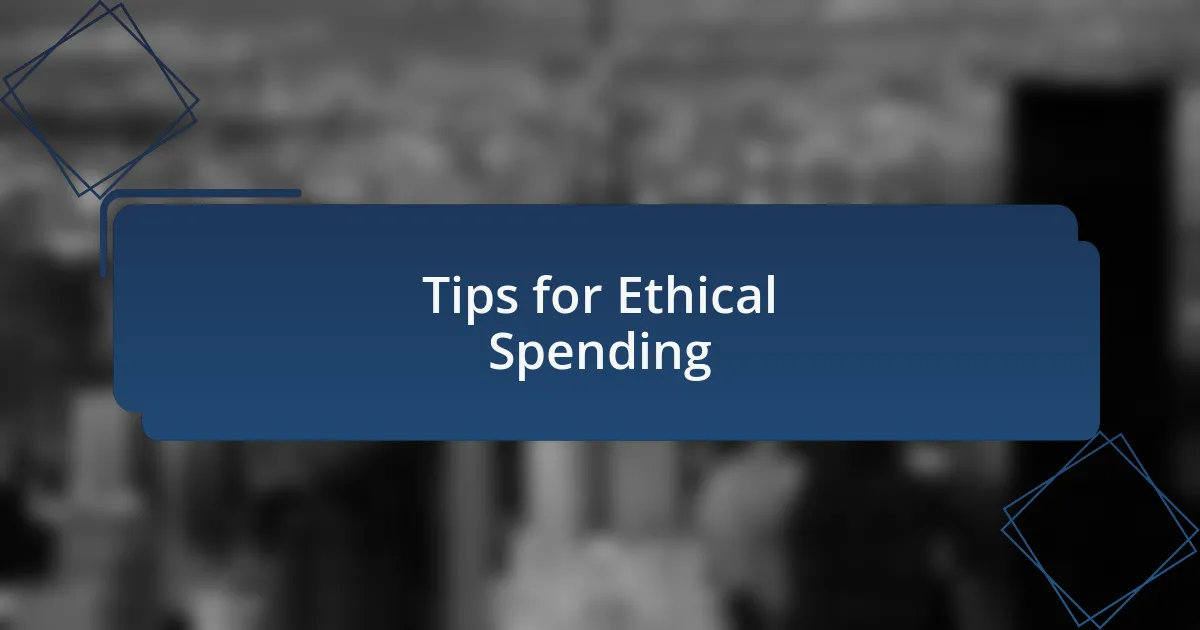
Tips for Ethical Spending
When I think about ethical spending, I realize that it’s essential to do a little research before making any purchase. There was a time I wanted to buy a new jacket but opted instead to look up brands that prioritize sustainable practices. I was amazed to discover a company that used recycled materials and paid fair wages. It made me wonder: how often do we blindly spend without considering the impact of our choices?
Another tip I learned is the power of asking myself whether a purchase is truly necessary. I used to buy items on impulse, but now I take a moment to consider if I genuinely need them. This practice not only helps me reduce waste but also empowers me to invest in high-quality, durable goods that align with my values. Have you ever felt the satisfaction of knowing you’re contributing to something greater by choosing wisely?
Finally, I can’t emphasize enough the significance of supporting local businesses. I remember the joy I felt visiting a nearby farmers’ market and meeting the vendors behind the produce I was buying. It’s more than just a transaction; it’s about building community and fostering connections. How fulfilling is it to know that your spending helps sustain local families and reduces environmental impact?
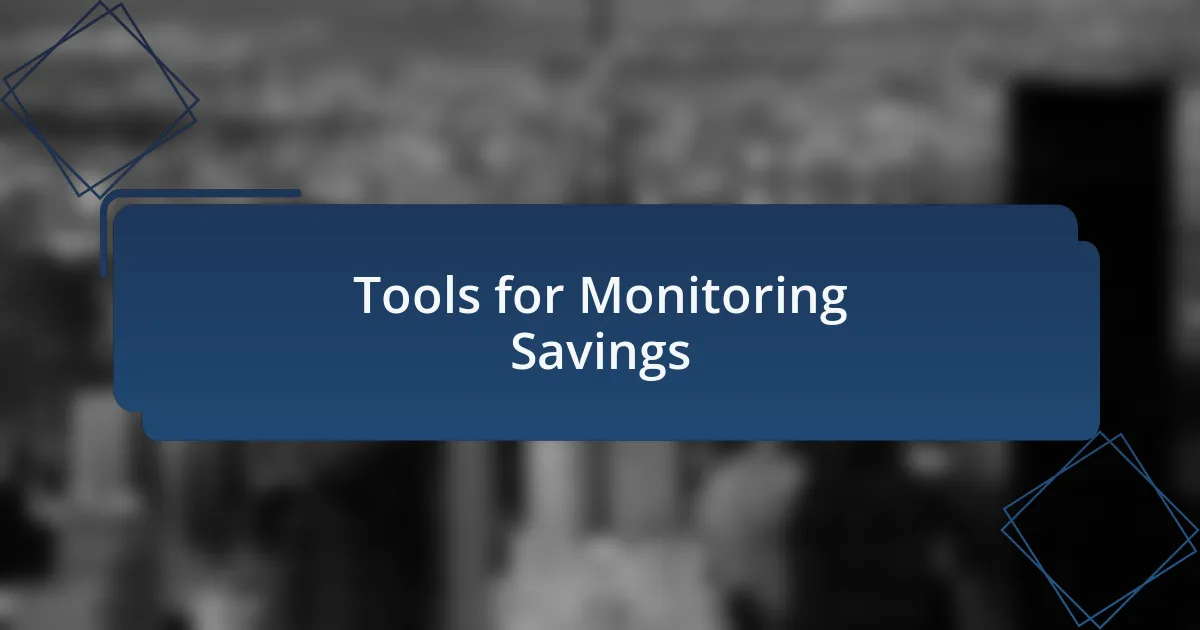
Tools for Monitoring Savings
When it comes to monitoring my savings, I’ve found that using digital budgeting tools can be a game-changer. For instance, apps like Mint or YNAB (You Need a Budget) allow me to track my expenses in real time, giving me a transparent view of where my money goes. It’s fascinating how just a few taps on my phone can reveal spending patterns I never noticed before—have you ever sat down and truly assessed your habits?
For a more tactile approach, I often use a simple spreadsheet. I created a savings tracker that gives me visual feedback on my progress. Every time I see those numbers climb, it feels rewarding and reinforces my commitment to ethical savings. Isn’t it amazing how a little visual aid can boost motivation?
Additionally, I love incorporating a cash envelope system for certain spending categories. When I allocate physical cash to categories like groceries or entertainment, it becomes easier to stick to my budget without overspending. I remember the thrill I felt when I successfully completed a month under budget; that sense of achievement fueled my desire to continue prioritizing my financial goals.
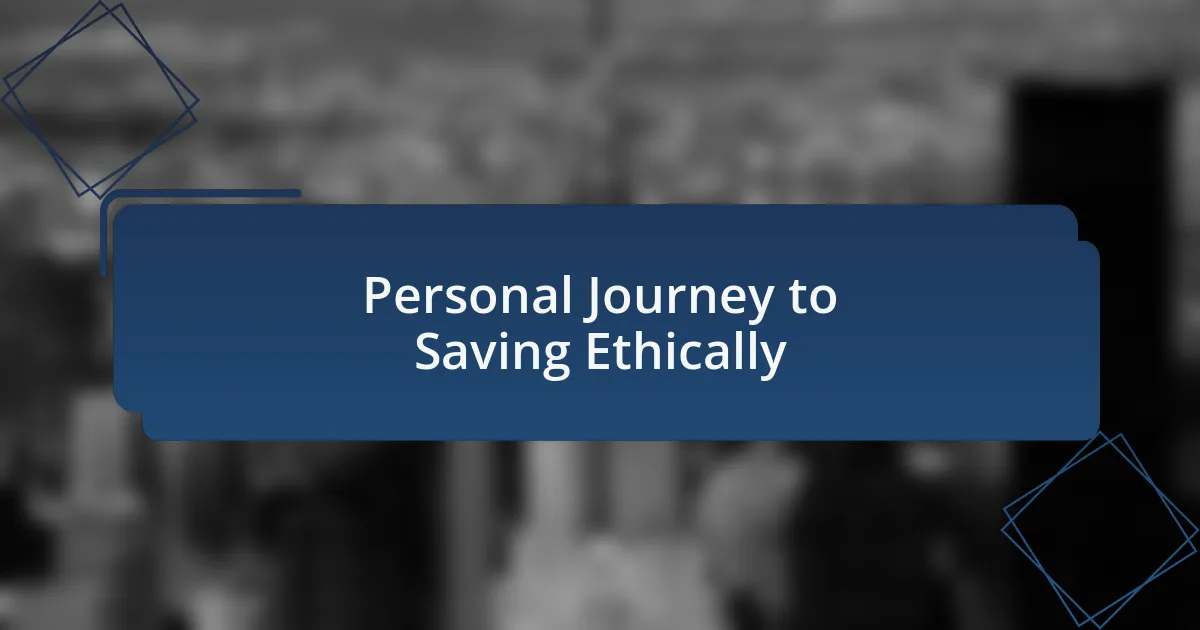
Personal Journey to Saving Ethically
Embarking on my journey to save ethically was initially filled with uncertainty. I clearly remember the moment it clicked for me—while reading a book about sustainable living, I realized my financial choices had a direct impact on the environment. This revelation shifted my mindset; saving money became not just about my finances but also about contributing to a healthier planet. Have you ever stopped to consider how your purchases align with your values?
As I began to research ethical savings strategies, I encountered terms like “impact investing” and “green banking.” I started small, shifting my savings into accounts that supported renewable energy projects. The sense of purpose that came with each deposit was empowering. Knowing that my money was promoting positive change encouraged me to dig deeper and find more ways to align my financial habits with my eco-friendly values.
Gradually, my approach to spending transformed as I prioritized businesses that practiced sustainability. I recall a memorable experience while shopping for clothes; instead of headlining fast fashion brands, I sought out second-hand stores and local artisans. The excitement of discovering unique pieces felt like a treasure hunt, and it reinforced my commitment to mindful spending. Have you considered the joy of making choices that reflect not just your preferences but also your principles?
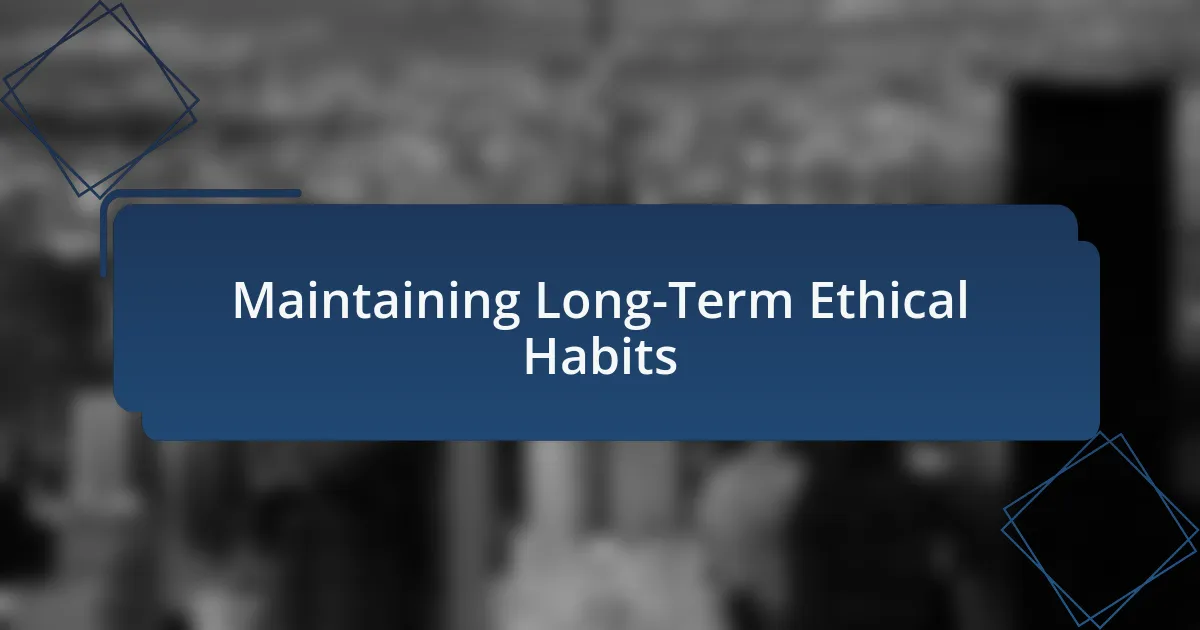
Maintaining Long-Term Ethical Habits
Cultivating long-term ethical habits isn’t just about initial choices; it’s a continual commitment that requires reflection and adjustment. I remember when I first shifted my grocery shopping habits to focus on local, organic produce. At times, the convenience of big-box stores tempted me, but I realized those choices often contradicted my values. Have you ever felt a tug between convenience and conviction?
To keep my ethical savings journey alive, I’ve found it helpful to set specific goals and regularly evaluate my financial practices. For example, I track how much of my savings contributes to eco-friendly initiatives, and this tangible measurement keeps my motivation strong. Engaging in community discussions or online forums also sparked new ideas and renewed my commitment. Have you sought out communities that share your values?
Moreover, integrating ethical habits into my daily routine became increasingly rewarding as I recognized their impact. One evening, as I sat reviewing my budget, I felt a wave of satisfaction knowing that every decision, from skipping plastic-wrapped snacks to opting for a vegan meal, aligned with my goals. Reflecting on these moments reinforces my dedication. What choices inspire you to stay true to your ethical aspirations?